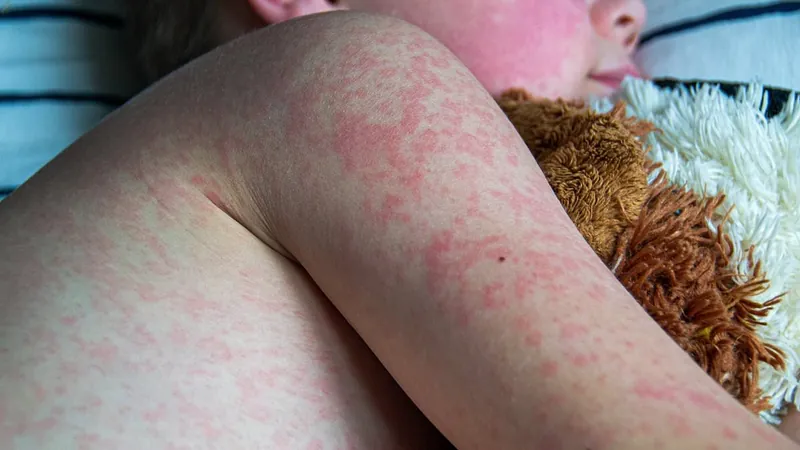
Foreign Traveler Brings Measles to Houston as Texas Faces Outbreak Crisis
2025-03-18
Author: Wei
In a shocking development, health officials in Houston have confirmed a case of measles in an unvaccinated infant who recently returned from international travel. The child has been hospitalized but has since been released to recover at home. This case comes to light as Texas grapples with a separate and significant outbreak of the disease.
Notably, this infection is not linked to the alarming outbreak in West Texas, where a staggering 294 individuals have been afflicted across three states, setting off more alarm bells than cases reported nationwide in 2024. This outbreak has taken a tragic turn, as an unvaccinated schoolgirl lost her life to measles last month—the first death attributed to the virus in the United States in a decade.
The new measles case has no ties to earlier cases recorded in January, which involved two unvaccinated adults in Houston, marking the city's first cases of the disease since 2018. Health officials are actively tracing anyone who may have been in close contact with the infant and are instructing them to self-isolate as a precaution. However, it's unclear if the infant traveled via a major airport.
Further details about the case remain sparse, including whether the traveler is a U.S. resident or the specifics of their travel itinerary—information withheld to protect the patient’s privacy, according to a spokesperson from the Houston Department of Health.
Measles is notorious for its incredibly high infection rate—affecting as many as nine out of ten unvaccinated individuals exposed to the virus. Dr. David Persse, the chief medical officer for Houston, strongly advocates for vaccination as the most effective means of preventing the disease. "The MMR (measles, mumps, and rubella) vaccine is safe, highly effective, and remains the best defense against this potentially severe disease," he urged.
Although measles was declared eliminated in the U.S. in 2000, the rise in international travel poses a continuing risk. Recent vaccination rates in Texas are alarming; only about 92 percent of kindergarteners were vaccinated against measles in the latest data from 2023 to 2024—far below the 95 percent threshold needed to prevent outbreaks, and lower than previous years.
Among the schools with the lowest vaccination rates in Houston is Acton Leadership Academy of Magnolia, which recorded a measles vaccination rate of just 36 percent. Its counterparts, Acton Academy Cy-Fair and Acton Leadership Academy of Creekside, both reported a vaccination rate of 50 percent. These statistics are concerning for public health advocates amid the ongoing threat of measles.
Measles spreads through respiratory droplets released by coughing or sneezing and can linger in the air for up to two hours after an infected person has left an area. Symptoms usually emerge seven to 14 days post-exposure, beginning with high fever, cough, runny nose, and red eyes, followed by a distinctive red, blotchy rash.
Complications arising from measles are particularly dangerous for young children and those with compromised immune systems. These can include pneumonia, brain swelling, and, in severe cases, death. The mortality rate for measles among infected children is about 1 to 2 per 1,000.
To effectively combat this public health crisis, vaccination is imperative—children are typically given their first dose at six months and a second between ages four and six. Treatment primarily involves symptom management, with a focus on rest and adequate medication to alleviate discomfort.
As the situation unfolds, health officials are urging Texans to ensure their vaccinations are up-to-date to safeguard not only their health but also that of the community.



 Brasil (PT)
Brasil (PT)
 Canada (EN)
Canada (EN)
 Chile (ES)
Chile (ES)
 Česko (CS)
Česko (CS)
 대한민국 (KO)
대한민국 (KO)
 España (ES)
España (ES)
 France (FR)
France (FR)
 Hong Kong (EN)
Hong Kong (EN)
 Italia (IT)
Italia (IT)
 日本 (JA)
日本 (JA)
 Magyarország (HU)
Magyarország (HU)
 Norge (NO)
Norge (NO)
 Polska (PL)
Polska (PL)
 Schweiz (DE)
Schweiz (DE)
 Singapore (EN)
Singapore (EN)
 Sverige (SV)
Sverige (SV)
 Suomi (FI)
Suomi (FI)
 Türkiye (TR)
Türkiye (TR)
 الإمارات العربية المتحدة (AR)
الإمارات العربية المتحدة (AR)